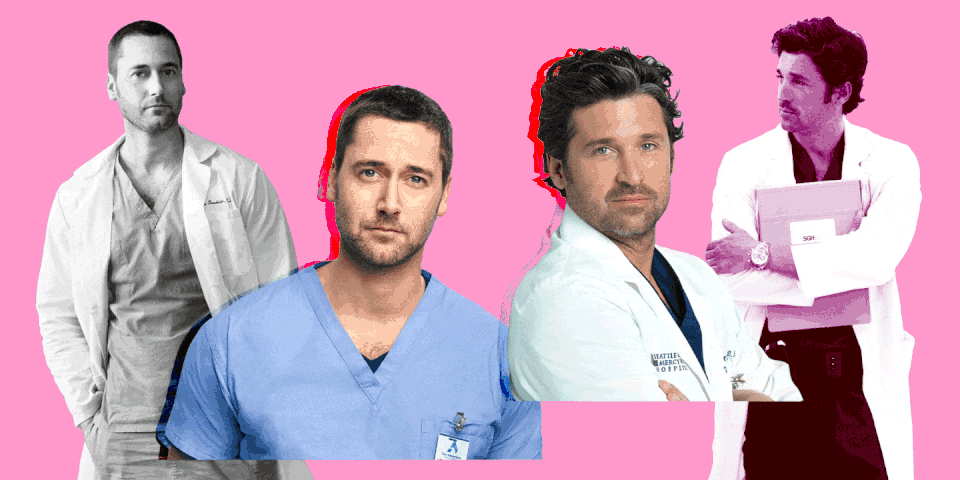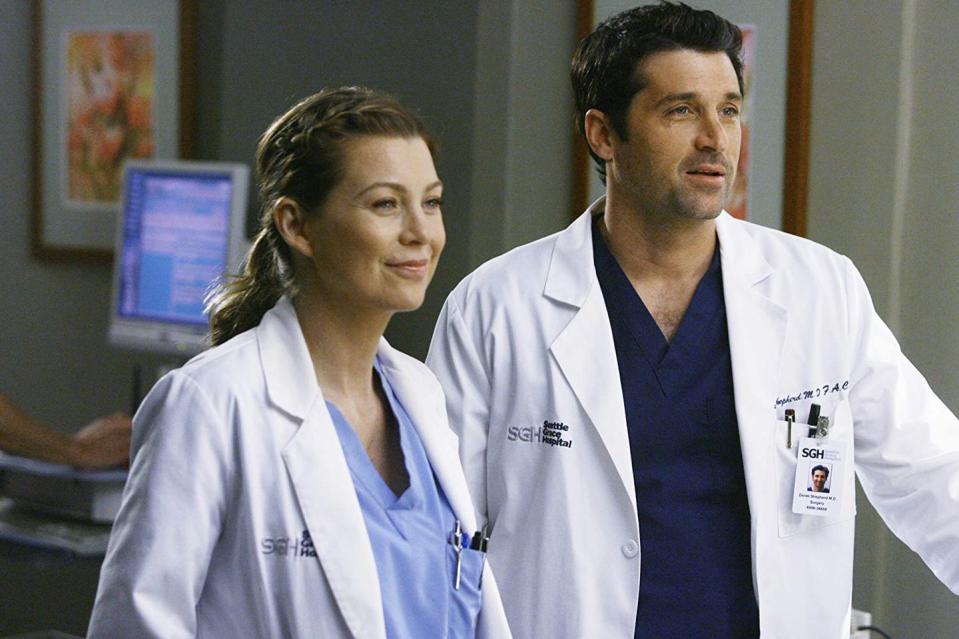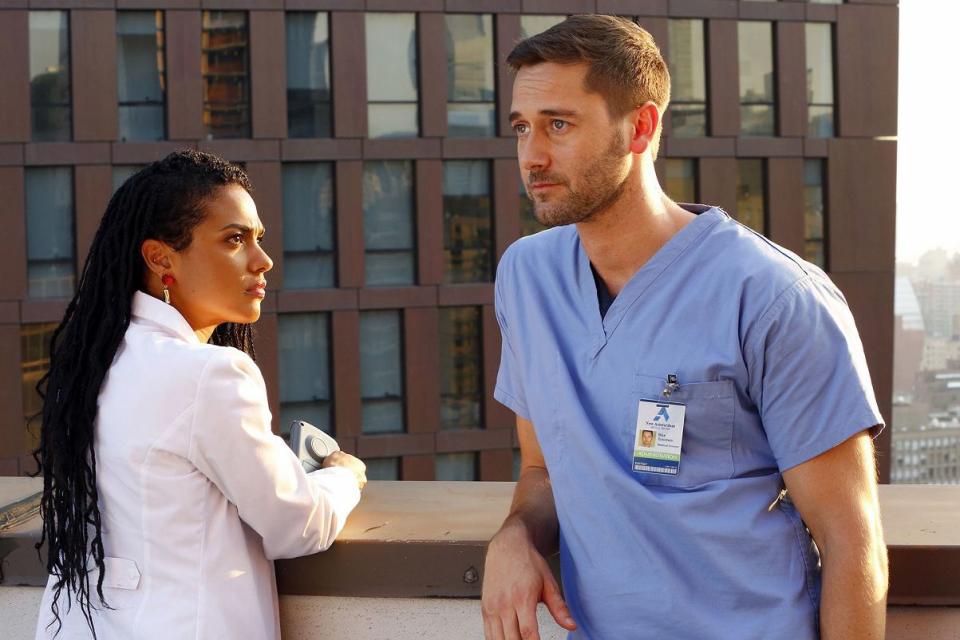Why We'll Always Have a Thing for Medical Dramedies on TV

In early October, New Amsterdam became the first freshman TV show to receive a full season pick up. The NBC drama, inspired by Dr. Eric Manheimer’s memoir, 12 Patients: Life and Death at Bellevue Hospital, takes place in a sprawling albeit aging New York hospital, where Dr. Max Goodwin (Ryan Eggold) vows to challenge the status quo with the confidence and swagger of most white male doctors we’ve already seen many times over on prime time.
And yet, New Amsterdam thrives, following in the footsteps of The Good Doctor, The Resident, and Chicago Med -- self-sustaining medical dramas birthed over the last two seasons that exist in the spirit of Grey’s Anatomy. In them, we meet a young-ish doctor who stands out from their contemporaries and sets out to prove they’re worthy of being so unique.
But the thing is, Grey’s Anatomy is an anomaly. Because where ER ended after its 15th season, Grey’s will soldier on until at least its 16th. Plus, it’s named after and focuses primarily on a woman. Dr. Meredith Grey (Ellen Pompeo) has endured more heartache and trauma than the cast of most medical dramas put together. So why even bother making more?

Easy: because when done right, they sustain themselves. While not every series makes it through, hits like House, Chicago Hope, Nurse Jackie, and ER serve as reminders that medical dramas can successfully serve up all necessary components of a bankable and complex drama. They deliver love stories, tales of personal growth, reminders that death is imminent, and contain themselves to a single industry (and even location) to assure viewers that these types of lives belong only to those who serve as medical professionals.
Translation: we’ve aged into them, we can live vicariously through them, and we can still sleep well knowing our own existences are a little more boring and predictable (thank heavens). These series are sources of believable escapism, set in buildings that tend to house our own worst case scenarios as grown-ass adults. Because when we find ourselves in the hospital under terrible circumstances, we get to distract ourselves less by our parents buying us popsicles and magazines, and more by thinking of all the drama we assume is taking place outside of where we’ve been admitted.
Anything to pass the time.

Which, as we’ve gleaned from the conveyor belt of police and CSI-spirited dramas, is a valuable and special thing. When you tune into a series set under an umbrella of a professional realm, there are certain guarantees. Capable people will do their jobs, villains (whether people or health scares) will rear their heads, and we’ll be privy to the personal lives of those the public put their trust in. Plus, the bulk of each episode will be wrapped up in about 60 minutes.
So even if you drop off a show and pick it up a few years later, enough will be the same that you can piece the missing plotlines back together. So-and-so may have broken up with what’s-his-name (or someone may have died), but it isn’t like returning to Game of Thronesafter a few years away. Instead, medical dramas are kind of like Cheers. As soon as you wade back in, it’s like everybody knows your name. Even if you still have to learn all of theirs.
Which can make medical dramas as a whole easy to write off, particularly in the era of prestige television. But to dismiss an entire genre is a mistake, especially when institutions like Grey’s have succeeded in challenging TV norms by delivering everything from musical episodes to shocking, tragic deaths of main characters to leads who are flawed, messy, brilliant, and unabashedly human.
In fact, Shonda Rhimes used Grey’s Anatomy to turn the standard medical drama on its head by prioritizing diversity, starting conversations about sexuality and sexual fluidity, and showcasing the dangers of toxic masculinity. (Remember: Alex was a straight-up nightmare in season one, and George spent a full episode whining about being seen as Izzy’s sister). No wonder the medical dramas continue to roll out. Who wouldn’t try to make lightning strike twice?
The thing is, this season’s crop of medical dramas seem to huddle under the safety of decades-long tropes as opposed to branching out in the spirit of Shondaland. The Good Doctor features a main character who has autism and Savant syndrome (which is a step in the right direction, considering most TV shows are inherently ableist), but he’s played by a young white man (just like the lead in The Resident). New Amsterdam seems to adhere to the rebel-with-a-heart-of-gold trope found formerly in House, but Dr. Goodwin’s swagger belongs more in the realm of cop shows (since we haven’t seen thatpersonality trait nearly enough). But its success also tells us that none of that particularly matters.
Enough people are feasting on the buffet of medical dramas to justify the creation of more and more. And just because some of us would rather watch Grey’s than The Resident doesn’t mean the latter is disposable. Especially if the latter offers 60 minutes of feeling nothing but empty feelings for fictional characters; nothing but disposable concern over people whose names you don’t actually know. Nothing but, well, nothing.
And to feel nothing -- to escape reality and find temporary reprieve -- is an incredible gift. It’s a privilege. And now, more than ever, we’re thirsting for that rare and diminishing gift. We’re desperate for a chance to escape into a world where a medical anomaly can be solved in an hour and some young doctor’s attitude is his own biggest problem. We’d do anything to remind ourselves that some people’s problems necessitate the most complicated surgery -- despite our own feeling (and being) very dire.
We crave formula and order and rules to play by. And while that feeling tends to evolve into wanting character development, complexity, and unique storylines -- despite being set in the same hospital (shout-out to the everlasting popularity Grey’s Anatomy) -- it lasts long enough to greenlight another medical drama we might not remember in a handful of years. It lasts long enough to keep us feeling cradled and looked-after until the high begins to diminish. Or, until we start trying to court lightening.
('You Might Also Like',)

 Yahoo Finance
Yahoo Finance 